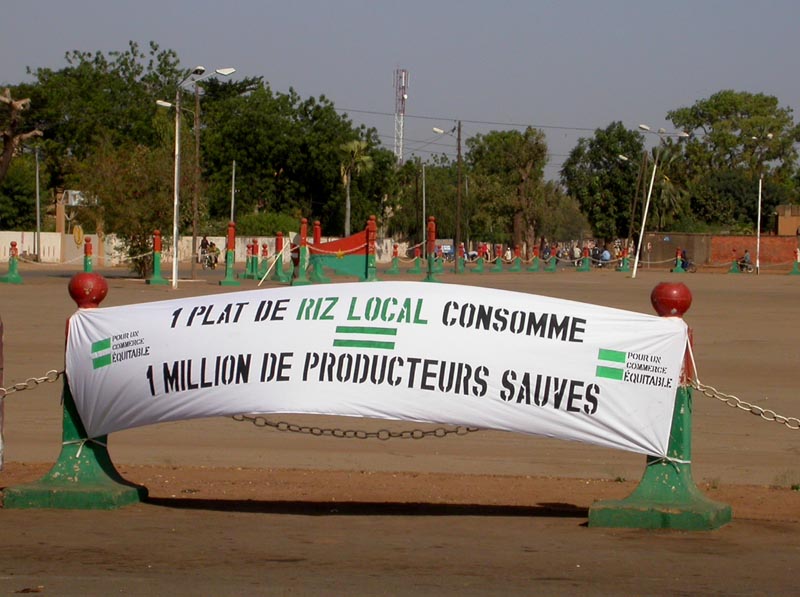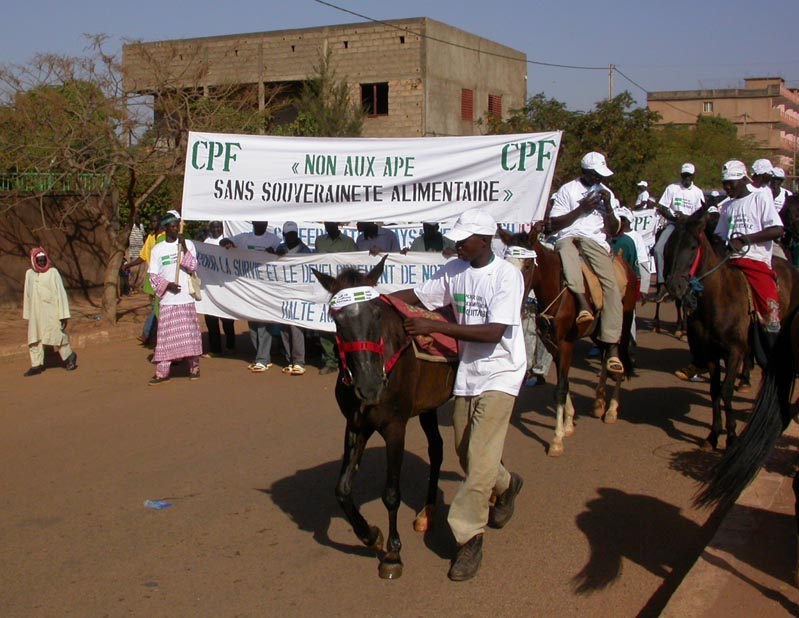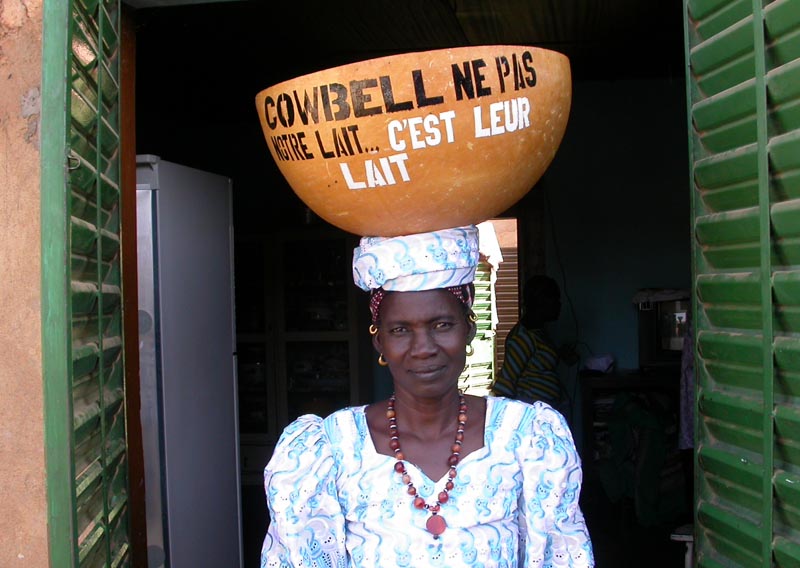We stand on the brink of an abyss
and are preparing to take a big step forward …
Ten years ago, in 2004, the SEDELAN (Service d’Editions en Langues Nationales – Publishing Office in National Languages in Koudougou, Burkina Faso) published a booklet ”The West African Rice Sector and the Need for Food Sovereignty”. We did so in order to show our concern. Our fears were shared by wide groups of the civil society in Burkina and in West Africa. In our publication we stated: ”No Economic Partnership Agreement without food sovereignty”. In 2005, before the WTO Ministerial Meeting, Burkina’s farmers came out in numbers brandishing their call: No EPAs without Food Sovereignty. Today we are no longer merely expressing our concern. We want to sound the alarm. We are on the brink of an abyss - and preparing to take a big step forward.

 These days I have read on several occasions in the African press that West Africa is preparing to take a big step, even a big leap forward. It is now ten years since the ECOWAS (the Economic Community of West African States) entered into negotiations on their Common External Tariff, CET, which embodies the whole range of import duties. It has taken ten years, which goes to prove that these talks have not been easy! Therefore, before rejoicing, we must take a look at the outcome. But until this day I have been unable to find a single journalist capable of explaining its content, or a politician who could clarify the choices made.
These days I have read on several occasions in the African press that West Africa is preparing to take a big step, even a big leap forward. It is now ten years since the ECOWAS (the Economic Community of West African States) entered into negotiations on their Common External Tariff, CET, which embodies the whole range of import duties. It has taken ten years, which goes to prove that these talks have not been easy! Therefore, before rejoicing, we must take a look at the outcome. But until this day I have been unable to find a single journalist capable of explaining its content, or a politician who could clarify the choices made.
These choices are disastrous for Burkina and for West Africa. The farmers have received nothing of what they demanded. A single example: While East Africa protects its rice trade successfully, taxing imports at 35 – 75 %, the West African ECOWAS has maintained its 10% tax, with the result we know. Our countries are invaded by old rice (up to 10 years of age) at below cost prices (also broken rice, even called ”luxury broken” !). We now hear that the new CET will enter into force on January 1st 2015.
And as one disaster never comes along alone, I am just learning that the European Union has signed its Economic Partnership Agreement with Africa without debate – the Europeans not having had the courage to call it a free trade agreement, which is what it actually stands for.
"How are we now to qualify this big step forward ?" As a friend recently put it in a letter: "For all African countries concerned all of peasant and subsistence farming, food security, current projects for processing on site, the development of a regional industry, all this will be hit head on by European competition, crushing employment, and by an even stronger dependence on world markets prices. It is the programmed looting of African natural resources of land and minerals. The self-propelled development of these countries and regional integration projects will be sacrificed for the benefit of the export geared and fuel consuming European economy, with little regard for the environment. The populations of Africa will be bound to import subsidised European products, which, even if of second rate quality, will compete with local production … Another consequence is foreseeable: massive migration."
With this comes the question which we cannot avoid asking: Among the millions of migrants who have lost all hope of a life in dignity at home, how many will join the ranks of Boko Haram or the Islamic State?.Yes, we stand on the brink of an abyss, and are about to take a big step forward.Or, if you prefer “the ship is sinking,” while we are celebrating the independence of Burkina.
Well, let us celebrate our independence, but let us start tomorrow and do some serious thinking, try to buy time and stop our ship from going down.
I appeal to the transitional government of Burkina. If you can block the signature of the EPA by the ECOWAS, do not hesitate. As for the CET it has already been signed. and is due to enter into force on the 1st of January 2015. This CET covers more than 5 000 tariff lines. Instead of setting out to change it all, suggest gradual amendments. Start by setting up a list of sensitive products. Include as a priority rice and milk powder. Propose to replace the current tariff (10% for rice and 5% for milk powder) by a simple alternative: establish an entry price (for imports arriving at ECOWAS ports, such as Lagos, Cotonou, Lomé, Abidjan, Dakar …) per ton of rice, for example 400 000 F in 2015. If rice comes in at these ports for 350 000 a ton, it will be taxed 50 000F, slightly more than the present 10%, in order to reach the established 400 000 F. On the other hand, high quality rice, less than a year old (in stark contrast to some rice from Thailand or of other origin) which enters Abidjan with a price tag of 500 000 F/ ton, will not be taxed. This mechanism is called ”variable levy”. It should protect us against massive imports of cheap rice, selling for less than its production cost, which ruin African rice farmers and halt the development of the rice sector.

As for milk powder I suggest an entry price of 75 000 for the 25kg bag entering the ECOWAS. Assuming that a 25kg bag enters the port of Lomé priced 70 000 F, a tax of 5 000 F would be added (reaching the 75 000 F fixed entry price), or slightly more than 7%. And barely more than the 5% current rate.
Note that if world market prices shoot up, as in 2007, market prices will be higher than the entry price and no levy will be due. Fixed entry prices will therefore act as stabilisers. If we are able to include all the sensitive farm and food products (approximately fifty) in the list, we would be able to maintain our food sovereignty.
For further reading on the ”entry price – variable levy ” tandem mechanism I refer you to our newsletter 472) Regulating farm and food prices and 473) WTO rules will not enable the ECOWAS to protect its agriculture.
This subject would deserve broadcasting time on national television, now appointed Ministre Déléguée of the Ministry of Economy and Finance and in charge of the budget of the provisional government. I have taken part in her program on several occasions and would be happy to do it again, for instance on a program entitled : « Which farm and food policy will we have after the signing of the ECOWAS CET and the Economic Partnership Agreement between Europe and West Africa?».
Our thanks to all those of you who can forward this newsletter to one (or more) members of the transitional government. There might still be time to stop our ship from sinking.
Koudougou, December 12 and 13, 2014
Maurice Oudet
Director and Editor, SEDELAN